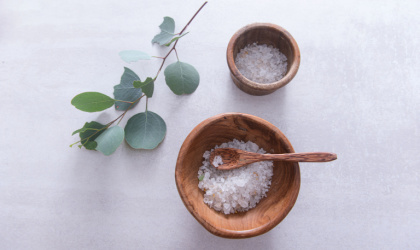
Many people turn to nature amidst the chaos and busyness of the modern world, but how does it support your health and the management of physical discomfort?
What are the benefits of spending time in nature?
Research suggests that spending at least 120 minutes a week in green spaces can lead to a greater sense of wellbeing (1). Natural settings have the power to energise us, make us happier, relieve stress, connect us to others, and provide space to move our bodies and ‘switch off’. And since physical discomfort is closely associated with emotional distress, time spent in the natural world may also improve symptoms.
Why does nature make us happy?
A space to see fractals
Fractals are repeating patterns that are ubiquitous in the natural world. You can see them in flowers, snowflakes, ocean waves, and leaves. As humans, we’re hard-wired to recognise these shapes in nature. And now research suggests exposure to fractals may reduce stress by up to 60% (2). Bringing images of the natural world indoors can even produce similar soothing effects, which may explain why we often use photos of sunsets as screensavers or fill our houses with plants. That fractural patterns may reduce stress and induce feelings of calm is hugely promising for our overall wellbeing and managing symptoms of physical discomfort.
A space to enjoy the sounds of nature
Birdsong, rainfall, ocean waves, the wind in the trees – the sounds of nature are inherently soothing and grounding. Researchers have found that natural sounds activate our parasympathetic nervous system, which is responsible for our ‘rest-and-digest’ state and associated with relaxation in the body (3). Immersing yourself in the soothing soundscapes of green spaces offers a great way to unwind, which can be immensely helpful if you’re in a cycle of physical discomfort and emotional distress.
A space to move
Of course, spending time in nature often means you’re moving your body. Exercise – even if all you can manage is a gentle stroll – releases feel-good hormones called endorphins, which are known to support your wellbeing and reduce symptoms of physical discomfort. Free and accessible, the natural world is, arguably, the best gym going.
A space to be mindful
When you’re dealing with physical discomfort, it’s not uncommon to feel overwhelmed with fear, frustration, anger, and despair. And these emotions can keep the cycle of physical discomfort going. Spending time in nature gives you space (literally and metaphorically) to ‘switch off’. Engrossing yourself in the natural elements – trees, plants, water, clouds moving in the sky – can help bring you back into the present moment and distract you from feelings of discomfort and its associated emotional distress. Read more about relaxation techniques to ease physical discomfort here.
A space to bask in the sun
Time spent in natural spaces also means time spent in sunlight. As humans, we all need exposure to sunlight. When the sun hits our skin and eyes, we synthesise vitamin D3, which plays a multifaceted role in health and wellbeing. Perhaps most importantly, vitamin D3 supports bones and muscle function, making it essential if you experience physical discomfort.
Beyond this, exposure to sunlight, especially in the morning, helps recalibrate your circadian rhythm (24-hour biological clock), which governs the sleep-wake cycle. Many people living with physical discomfort struggle with sleep. But the simple act of stepping outside and flooding your eyes with natural sunlight will help you achieve a better night’s rest and wake feeling refreshed. And the better you sleep, the less sensitive you’ll be to discomfort the next day (4).
A space to connect
Spending time in natural spaces doesn’t only afford us the space to connect us to nature, but to others. We’re a hive species, after all. We need social interaction to survive and thrive. When we feel connected to others, we feel safe. And communicating messages of safety is one of the best ways to downregulate our nervous system and reduce symptoms of physical discomfort.
Studies have linked loneliness to poorer psychological and physical health outcomes (5). And so, any opportunity to connect with others in nature – be it a walk in your local park with a loved one, sharing a smile with a stranger, or greeting a passing neighbour on the street – is an opportunity to help you feel part of something bigger and support your wellbeing.
Supplement support for physical discomfort
Aside from spending time in green spaces, you may wish to add the following supplements to your diet to manage symptoms.
Vitamin D3
Vitamin D3 is a popular choice since it contributes to the maintenance of normal muscle function.
PEA
PEA belongs to a group of natural compounds which are vital for chemical signalling in the body, and it can be found in almost every cell in the body. It is naturally produced when cells are damaged or threatened. It’s a popular choice to tackle those niggles that might hold you back.
Magnesium
Magnesium is an essential mineral that plays an integral role in many body processes. It is often recommended by nutritionists since it contributes to the maintenance of normal muscle function.
Glucosamine & Chondroitin
The combination of glucosamine and chondroitin has become one of the most popular supplements with millions of people choosing to take it on a regular basis.
Turmeric
Turmeric has a long history of use in health and wellness. Curcumin, the natural compound found in turmeric, is said to be responsible for the spice’s properties.
Devil’s Claw
Devil's Claw is a traditional herbal medicinal product used for the relief of backache, rheumatic or muscular pain, and general aches and pains in the muscles and joints.
Omega-3s
Found in oily fish and microalgae, the long-chain omega-3 fatty acids are important for good overall health. Omega-3s are often recommended as a perfect partner to Devil’s Claw.
Rosehip
Regarded as a 'super-fruit' by herbalists, rosehip is a popular choice for those who take Glucosamine or Devil’s Claw.
Want to find out more?
Read more of our resources on managing physical discomfort here. You can also reach out to our expert Nutrition Advice team to receive free nutrition advice. No matter how small your query, they’re happy to help.
Call: 01892 352927
Email: nutrition@naturesbest.co.uk
Write: Nature’s Best Ltd. Century Place, Tunbridge Wells, Kent, TN2 3BE
References:
-
White MP. et al., Spending at least 120 minutes a week in nature is associated with good health and wellbeing. Sci Rep. 2019;9,7730.
-
Psychology Today. (2022). Fun with Fractals? Available online: https://www.psychologytoday.com/gb/blog/codes-joy/201209/fun-fractals
-
www.bsms.ac.uk. (2022.). It’s true – the sound of nature helps us relax – BSMS. Available online: https://www.bsms.ac.uk/about/news/2017/03-31-the-sound-of-nature-helps-us-relax.aspx
-
Available online: https://www.ncbi.nlm.nih.gov/pmc/articles/PMC4046588/
-
Manual, B. (2022). Why Loneliness Can Be Deadly. Live Science. Available online: https://www.livescience.com/18800-loneliness-health-problems.html.
Related Posts

Olivia
Olivia Salter has always been an avid health nut. After graduating from the University of Bristol, she began working for a nutritional consultancy where she discovered her passion for all things wellness-related. There, she executed much of the company’s content marketing strategy and found her niche in health writing, publishing articles in Women’s Health, Mind Body Green, Thrive and Psychologies.
View More



